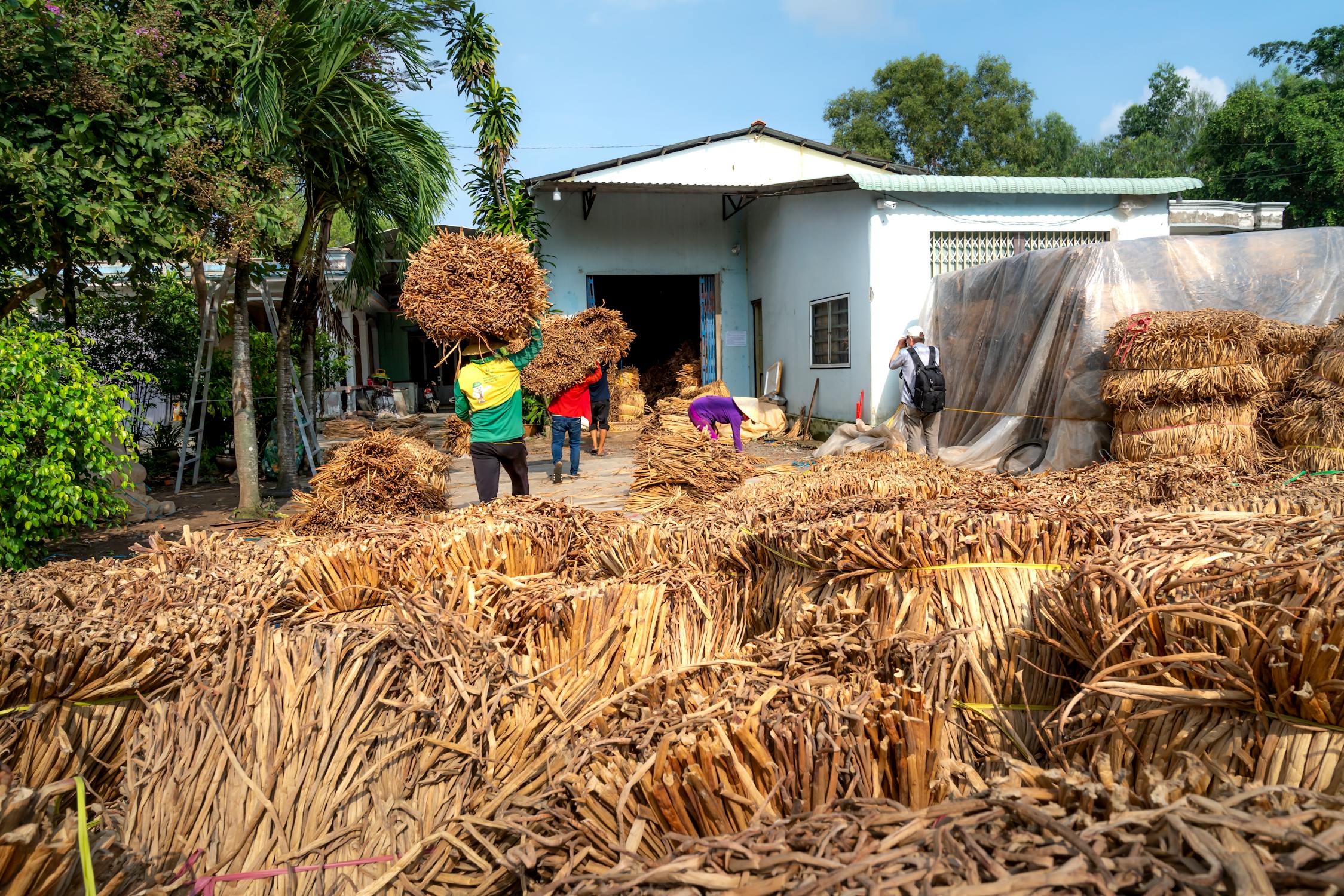From Farm to Market: How to Start a Food Processing Business in Nigeria
Table of Contents

Agriculture remains a cornerstone of Nigeria’s economy, but many farmers and entrepreneurs miss out on huge profits because they only sell raw produce. Food processing—turning raw crops into packaged or semi-finished products—adds significant value. For example, processed tomato paste, garri, groundnut oil, and plantain chips often sell for 2–5 times the price of raw materials. This post will guide you through launching your own small-scale food processing business, even if you’re starting with limited capital.
Why Food Processing is a Goldmine
Nigeria’s large population and growing urban centers create constant demand for ready-to-eat or easy-to-prepare food. Many people no longer have time to process food themselves, preferring hygienically packaged and readily available options. By filling this gap, food processors earn handsomely while supporting local agriculture. Examples include packaging ground pepper, frying and selling plantain chips, or processing cassava into garri and starch.
Plantain Chips Production
This business involves buying green plantains in bulk, slicing them with a hand or electric slicer, deep-frying them in vegetable oil, and packaging them in branded, sealed nylon bags. It’s a favorite snack across Nigeria. You can start from home with a capital of ₦50,000–₦80,000. Once you scale up to supplying schools and supermarkets, profits can reach ₦100,000–₦150,000 monthly. You’ll need a fryer, slicer, sealing machine, and branded packaging.
Tomato Paste Production
Tomatoes are highly perishable and often wasted during peak season. This business helps reduce post-harvest losses. You’ll need to buy ripe tomatoes, blend them, cook them to a thick paste, and store them in clean, airtight containers or sachets. With ₦150,000–₦200,000, you can get basic blenders, pots, gas burners, and packaging materials. Selling small packs in the market or to restaurants could yield ₦80,000–₦200,000 in monthly profits.
Garri Processing
Garri is a staple food in Nigeria. You’ll buy cassava tubers, peel, wash, ferment for 2–3 days, grate, press out the water, sieve, and fry. The major tools include a grater, presser, and fryer (which could be a large metal pan over firewood or gas). Starting capital is ₦70,000–₦120,000. You can sell to local markets or resellers. With high demand, you could earn ₦60,000–₦150,000 monthly.
Groundnut Oil Extraction
This involves roasting groundnuts, grinding them, and using a manual or mechanical press to extract oil. The remaining cake can be sold as animal feed, offering another income stream. The startup cost ranges from ₦100,000 to ₦250,000 for a small-scale operation, including a roaster, oil press, and filtering tools. Monthly income can exceed ₦200,000 if you package and brand the oil for sale in bottles.
Spice Packaging
Nigerians use spices daily in cooking. This business involves sourcing bulk dry spices like ginger, garlic, pepper, and turmeric, grinding them, and packaging them in sachets or plastic containers. It’s easy to start with ₦40,000–₦80,000, especially if you already have a blender. Profits come from supplying to food vendors, market sellers, and online customers. Monthly profits can range from ₦50,000–₦120,000.
Each of these businesses has low barriers to entry, scalable production models, and strong market demand. The key is to focus on hygiene, consistent quality, and attractive packaging.
Steps to Launch Your Food Processing Business
Market Research: Visit markets, stores, and supermarkets to understand what products are in demand. Talk to local vendors and potential customers.
Sourcing Raw Materials: Buy directly from farmers or wholesale markets to reduce costs. This increases your profit margin.
Basic Equipment: Depending on your product, you’ll need tools like slicers, fryers, blenders, sealers, weighing scales, and packaging materials. These are all available in local markets.
Packaging and Branding: Invest in attractive packaging. Consumers are more likely to buy well-labeled, sealed, and professional-looking products.
Health and Safety Compliance: Register with NAFDAC and ensure your production environment is clean and meets hygiene standards. Even if starting small, this builds customer trust.
Running the Business Day-to-Day
Start production in small batches to test your market. Use friends and family to try samples and get feedback. Create a daily or weekly plan for sourcing, production, packaging, and delivery. Track your expenses and profits carefully using spreadsheets or mobile apps. Partner with local delivery riders or use platforms like Bolt Food to distribute in cities.
Marketing and Sales Channels
Sell your products in local markets, schools, supermarkets, and online through Instagram, WhatsApp, and Jumia. Offer free samples to supermarkets in exchange for shelf space. Attend local fairs, agricultural expos, and food festivals to build awareness. Run WhatsApp campaigns targeting women groups, health-conscious consumers, and young professionals.
Turning Crops into Cash
Nigeria’s food processing industry is wide open and waiting for smart entrepreneurs. With a good understanding of your market, basic equipment, and dedication to quality, you can turn ordinary crops into high-value products that command better prices. Whether it’s groundnut oil, garri, tomato paste, or spices, your journey from farm to market could be your most profitable move yet. Now is the time to turn agricultural potential into personal profit.

Agriculture remains a cornerstone of Nigeria’s economy, but many farmers and entrepreneurs miss out on huge profits because they only sell raw produce. Food processing—turning raw crops into packaged or semi-finished products—adds significant value. For example, processed tomato paste, garri, groundnut oil, and plantain chips often sell for 2–5 times the price of raw materials. This post will guide you through launching your own small-scale food processing business, even if you’re starting with limited capital.
Why Food Processing is a Goldmine
Nigeria’s large population and growing urban centers create constant demand for ready-to-eat or easy-to-prepare food. Many people no longer have time to process food themselves, preferring hygienically packaged and readily available options. By filling this gap, food processors earn handsomely while supporting local agriculture. Examples include packaging ground pepper, frying and selling plantain chips, or processing cassava into garri and starch.
Plantain Chips Production
This business involves buying green plantains in bulk, slicing them with a hand or electric slicer, deep-frying them in vegetable oil, and packaging them in branded, sealed nylon bags. It’s a favorite snack across Nigeria. You can start from home with a capital of ₦50,000–₦80,000. Once you scale up to supplying schools and supermarkets, profits can reach ₦100,000–₦150,000 monthly. You’ll need a fryer, slicer, sealing machine, and branded packaging.
Tomato Paste Production
Tomatoes are highly perishable and often wasted during peak season. This business helps reduce post-harvest losses. You’ll need to buy ripe tomatoes, blend them, cook them to a thick paste, and store them in clean, airtight containers or sachets. With ₦150,000–₦200,000, you can get basic blenders, pots, gas burners, and packaging materials. Selling small packs in the market or to restaurants could yield ₦80,000–₦200,000 in monthly profits.
Garri Processing
Garri is a staple food in Nigeria. You’ll buy cassava tubers, peel, wash, ferment for 2–3 days, grate, press out the water, sieve, and fry. The major tools include a grater, presser, and fryer (which could be a large metal pan over firewood or gas). Starting capital is ₦70,000–₦120,000. You can sell to local markets or resellers. With high demand, you could earn ₦60,000–₦150,000 monthly.
Groundnut Oil Extraction
This involves roasting groundnuts, grinding them, and using a manual or mechanical press to extract oil. The remaining cake can be sold as animal feed, offering another income stream. The startup cost ranges from ₦100,000 to ₦250,000 for a small-scale operation, including a roaster, oil press, and filtering tools. Monthly income can exceed ₦200,000 if you package and brand the oil for sale in bottles.
Spice Packaging
Nigerians use spices daily in cooking. This business involves sourcing bulk dry spices like ginger, garlic, pepper, and turmeric, grinding them, and packaging them in sachets or plastic containers. It’s easy to start with ₦40,000–₦80,000, especially if you already have a blender. Profits come from supplying to food vendors, market sellers, and online customers. Monthly profits can range from ₦50,000–₦120,000.
Each of these businesses has low barriers to entry, scalable production models, and strong market demand. The key is to focus on hygiene, consistent quality, and attractive packaging.
Steps to Launch Your Food Processing Business
Market Research: Visit markets, stores, and supermarkets to understand what products are in demand. Talk to local vendors and potential customers.
Sourcing Raw Materials: Buy directly from farmers or wholesale markets to reduce costs. This increases your profit margin.
Basic Equipment: Depending on your product, you’ll need tools like slicers, fryers, blenders, sealers, weighing scales, and packaging materials. These are all available in local markets.
Packaging and Branding: Invest in attractive packaging. Consumers are more likely to buy well-labeled, sealed, and professional-looking products.
Health and Safety Compliance: Register with NAFDAC and ensure your production environment is clean and meets hygiene standards. Even if starting small, this builds customer trust.
Running the Business Day-to-Day
Start production in small batches to test your market. Use friends and family to try samples and get feedback. Create a daily or weekly plan for sourcing, production, packaging, and delivery. Track your expenses and profits carefully using spreadsheets or mobile apps. Partner with local delivery riders or use platforms like Bolt Food to distribute in cities.
Marketing and Sales Channels
Sell your products in local markets, schools, supermarkets, and online through Instagram, WhatsApp, and Jumia. Offer free samples to supermarkets in exchange for shelf space. Attend local fairs, agricultural expos, and food festivals to build awareness. Run WhatsApp campaigns targeting women groups, health-conscious consumers, and young professionals.
Turning Crops into Cash
Nigeria’s food processing industry is wide open and waiting for smart entrepreneurs. With a good understanding of your market, basic equipment, and dedication to quality, you can turn ordinary crops into high-value products that command better prices. Whether it’s groundnut oil, garri, tomato paste, or spices, your journey from farm to market could be your most profitable move yet. Now is the time to turn agricultural potential into personal profit.


